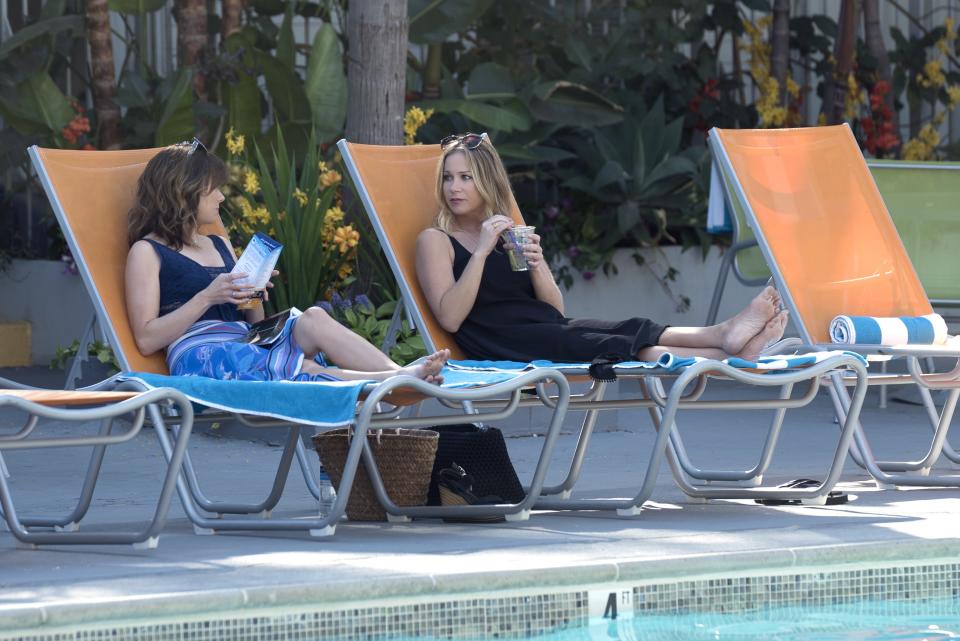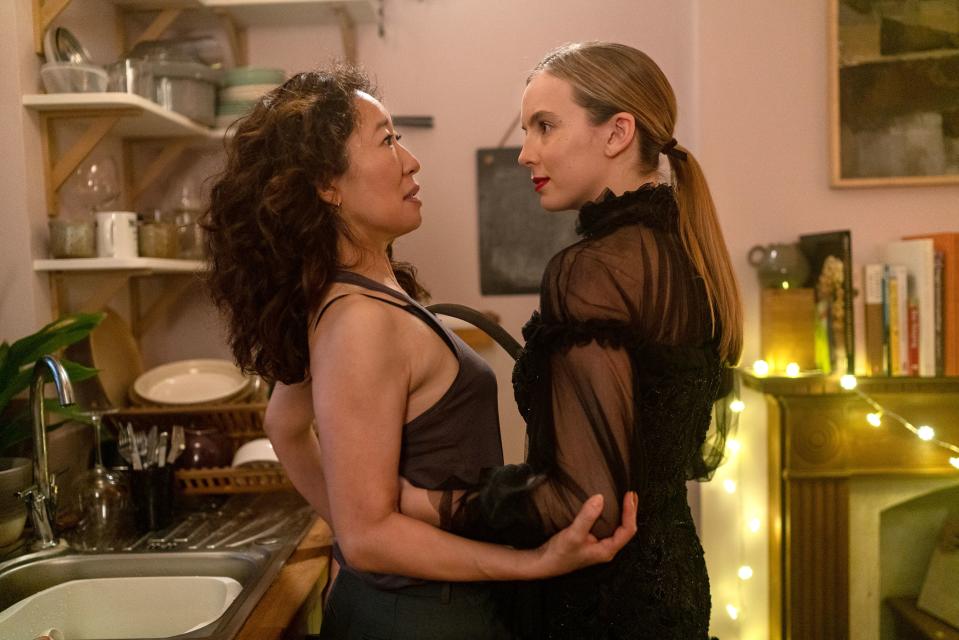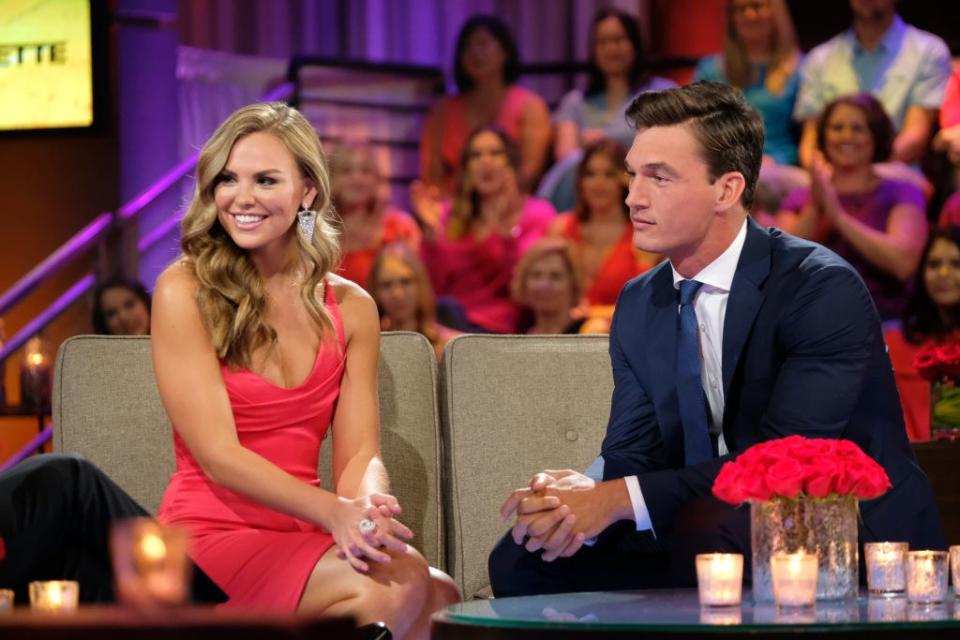The Sexiest Thing on TV Right Now: Women Ignoring Men

If someone offered me $100 to name just one male character on Big Little Lies, I would not be $100 richer. And I’m not the only one who found these guys unmemorable. While a hilarious internet joke, the disposability of these seemingly nameless characters on Big Little Lies is indicative of a bigger trend: TV's will-they-or-won’t-they trope is evolving along with our culture. Gone are the days of “We were on a break!”
Both the female characters and the audience of Big Little Lies were dismissive of the men on the show because, honestly, did we need them? When the guys did demand attention, they were met with frustration and annoyance. After all, that's one less moment for Nicole Kidman to slap Meryl Streep or Laura Dern to do, well, anything. But more than the audience’s desire to watch Reese Witherspoon throw an ice cream cone, I think the expendability of the male characters is rooted in a deeper storytelling shift. Female characters on TV are now less likely to be defined by their romantic relationships, and the role of the romantic lead has shrunk in consequence. On Big Little Lies, this shift can be seen in Madeline’s lifeless extramarital affair. It wasn’t some lusty, longing relationship. It wasn't even the biggest thing happening in her life. Instead, Madeline was practically sleepwalking through the motions, which is more a reflection of her restlessness than her libido. It wasn’t that Madeline was torn between two men, in other words. She was torn between two versions of herself.

1
Netflix’s Dead to Me and GLOW also focus on female friendships over a major will-they-or-won’t-they romance. There are relationships with men, sure, but they're not at the center. Even Dead to Me’s James Marsden—who has a face created for the longing glances that define will-they-or-won’t-they couples—is mostly there to get in the way of Christina Applegate’s and Linda Cardellini’s characters. He's simply an instrument used to create tension between the women.
Both Crazy Ex-Girlfriend and Broad City came to an end this year without the culmination of a will-they-or-won’t-they couple finally getting together. Crazy Ex-Girlfriend especially seemed like it might end with a romantic climax—the show did begin with a woman moving across the country for her ex-boyfriend, after all—but Rebecca’s romantic pursuits were in truth a reflection of her mental health, and that was the note on which the show ended. Meanwhile, Broad City expertly subverted the trope throughout its run: First with Abbi’s flirtation with her neighbor, which culminated in a single night, and later through her relationship with her former coworker, which ends with a rejected marriage proposal.
The will-they-or-won’t-they trope isn’t totally dead, though—it’s just evolving. There's no better example of this than Killing Eve. If the Big Little Lies formula is about female characters finding deeper intimacy among their friends than their romantic partners, Killing Eve takes that and turns it up 10 notches. The show’s central will-they-or-won’t-they couple is a pair of female friends. That is, if Eve and Villanelle are friends? Or are they in love with each other? Or both? Whatever the case, Sandra Oh’s Eve, a British intelligent investigator with amazing hair, and Jodie Comer’s Villanelle, an assassin with whom Eve becomes obsessed, are one of television’s steamiest couples, with the question being: Will they get together? And, Won’t they end up killing each other?

TCDKIEV EC057
Phoebe Waller-Bridge’s Fleabag also found a fresh way to execute the trope. In season two, Fleabag’s love interest is the Hot Priest. (Oh, his beautiful neck.) Of the two, the Hot Priest is the softer, more sensitive, vulnerable character. He essentially takes on the characteristics of how female characters are traditionally been written, as he shyly flirts with Fleabag, torn between his infatuation with her and his religious obligations. Fleabag, on the other hand, is the pursuant. The flipping of the traditional roles, which in turn flipped the power structure, made for a thoroughly engaging dynamic.
I argue that we can trace the reconsideration of this trope to Lena Dunham’s Girls, which opened with Hannah and Adam as the central romantic relationship. In the final two seasons, however, Adam starts dating Hannah’s best friend, Jessa. That relationship suddenly makes so much more sense than Hannah and Adam’s ever did. The show closed with Adam and Jessa together, and Hannah out of their story. Which makes Hannah—the protagonist of the show, mind you—most akin to The Office’s Roy, Friends’s Julie or Emily, or Grey's Anatomy’s Nurse Rose.
This shift is even apparent on reality TV. The Bachelor franchise is essentially a will-they-or-won’t-they of one bachelor/bachelorette and the contestants vying for their heart. The basic premise of the series hasn’t changed over the years, but the latest season of The Bachelorette ended with Hannah Brown calling off her engagement and reveling in her singlehood. It even gave her the freedom to ask out Tyler Cameron, a fan-favorite contestant she had previously sent home, for a casual drink, no expectations.

ABC's "The Bachelorette" - Season 15
This shift away from the traditional execution of the will-they-or-won’t-they trope is fueled by our culture, of course. In particular, the #MeToo movement has put many relations under the microscope—and many of television’s most beloved couples are now seen as problematic. Ross Geller is misogynistic, Aidan Shaw controlling, and Chuck Bass a sexual predator. There’s also been a push for more diversity behind the camera, leading to more women in roles of creative authority. And shows led by female showrunners—Girls, Killing Eve, Fleabag, Crazy Ex-Girlfriend, Glow, and Broad City included—often subvert or reject altogether the will-they-or-won’t-they cliché. Considering the sole purpose of it seemed to be enticing female viewership in the first place, it's empowering to watch it be dismantled and reconstructed by creative female minds.
So, yes, gone are the days of “We were on a break!” But in its place we now have Laura Dern’s “I will not not be rich!” And that’s a fair, if not better, trade.
Veronica Walsingham is an arts and culture writer.
Originally Appeared on Glamour

